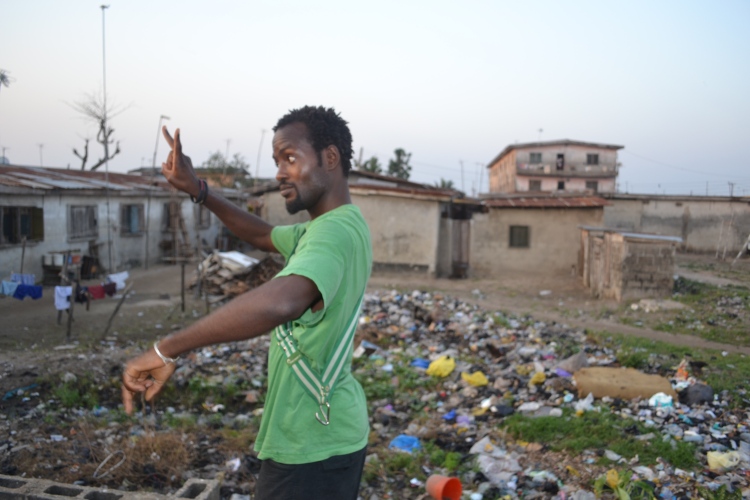When you close your eyes and listen to the samba being played perfectly in time with rhythm, soul, and an undeniable vibrancy, you would imagine yourself to be in the streets of Rio. But this is not Brazil, we’re still in Lagos after all. Up wind of a makeshift rubbish dump, kids cover every inch of ground, step, wall and rooftop available. They don’t notice the smell wafting over the compound wall, they’re too busy watching the spectacle before them, something they’re not used to seeing in their modest part of town.
 Seyi Ajeigbe, Nigerian/British musician (soundbites from his band AGEMO can be enjoyed here) has returned home (and brought me with him!) to give his local community something he had longed for as a child – a place that would enable him to escape his daily struggles as his mother worked hard to raise him and his four siblings in a sprawling African ghetto by herself. A space in which he could bring to life the music from his imagination. A place where he could simply, play a drum and get lost in the music.
Seyi Ajeigbe, Nigerian/British musician (soundbites from his band AGEMO can be enjoyed here) has returned home (and brought me with him!) to give his local community something he had longed for as a child – a place that would enable him to escape his daily struggles as his mother worked hard to raise him and his four siblings in a sprawling African ghetto by herself. A space in which he could bring to life the music from his imagination. A place where he could simply, play a drum and get lost in the music.
After discovering Brazilian samba eight years ago whilst living in London, Seyi found something that matched the rhythmic beat inside him that he just couldn’t say no to. He excelled at playing samba in various forms and went on to perform all over the UK and throughout Europe. Life was pretty darn good on the drumming front, it would seem, but Seyi couldn’t shake an idea that he had had very early on in his samba career. He imagined playing this same samba, not in Brazil, but back home in Lagos, returning it to the continent where the very roots of this music had originated.
Seyi has established the first samba school in Nigeria – Eko Samba School – a non-profit organisation, which enables children from his local community to learn to play Brazilian drums. Bridging gaps between children from a mix of social, tribal and religious backgrounds, giving them team working and leadership skills as well as improving their social responsibility, and above all, learning, enjoying and performing together, it is clear this is something well deserved in this community.
 Despite encountering many a bureaucratic hurdle with regards to getting support for the project here in Lagos, Seyi sums up the positives in an interview with Arise magazine:
Despite encountering many a bureaucratic hurdle with regards to getting support for the project here in Lagos, Seyi sums up the positives in an interview with Arise magazine:
“The best part so far has been the music itself. It brings a lot of satisfaction to hear the samba swing in the middle of a slum in Lagos, it’s as if the souls of those slaves taken via Lagos to Brazil are returning.”
For me, the best part so far is the ear to ear grins on these kids’ faces, the freedom in their enjoyment, as they sing and dance, sweat pouring from their bodies, and they play (and I mean they really play) those drums.

